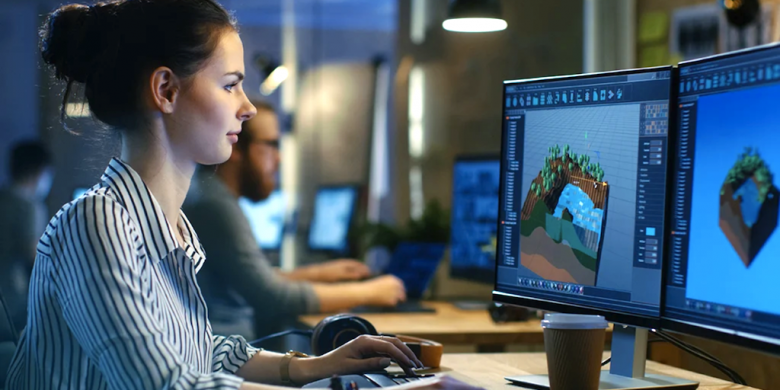
How To Get Into Game Design, From Somebody Who’s Done It Before

AUSTRALIA’S LEADING DESIGN SCHOOL SINCE 1987
Video games are having a moment. Thanks to a growing number of beloved big studio titles and indie gems, games are finally being recognised as a true art form.
What used to be considered a niche hobby has turned into an increasingly mature and rapidly growing industry, worth a casual $4billion in Australia alone. These days, games are about more than just shooting bad guys, and even the ones that are about that are becoming big blockbuster productions.
Now, games are being used to tell complex and emotional stories. With so many incredible games available now, and bigger and better ones being made every year, there’s never been a better time to get involved.
So, to find out how to get into game design, we spoke to three people from Billy Blue College of Design at Torrens University Australia who are working in the industry about how to turn a passion for games into a career.
What kind of career will a game design degree get you?
A lot of people associate game design with straight-up coding. And while that’s partially true, Dylan Faith, a graduate of Billy Blue’s game design program, says making games is more like working in the film industry.
“The director might provide the artistic direction, but the film is put together by hundreds or thousands of talented people.”
That includes artists who make it look good, coders who make it work, and designers who bring it all together. Then there are marketers who sell the products and admin teams who run everything behind the scenes.
What skills will prepare you to study game design?
Alexandra Sheather, a junior Unreal Engine designer and Billy Blue graduate, says that Google and YouTube are your best friends when you’re first getting into game design. “There are so many creators out there sharing their knowledge.”
She recommends picking an engine, like the Unreal Engine, CryEngine, or Source 2, and experimenting with pre-made assets. That will help you figure out what you enjoy the most and what study options are right for you.
“The only thing you really need to start on a path towards the game industry is a passion for games and a willingness to learn,” says Faith, who says it’s as simple as brushing up on your maths if you’re interested in coding or drawing your own concept art if you’re an artist — all of which are conveniently covered in Billy Blue’s game courses.

Image: Gorodenkoff / Shutterstock
What would you say to young girls interested in studying game design?
“The world needs your unique perspective,” says Tece Bayrak, a senior lecturer in the Department of Game Development at Media Design School New Zealand – Billy Blue College of Design’s sister school.
She encourages anyone and everyone with a passion to get involved. If you’re not a serious gamer but you want to tell stories, create code, or design worlds, you’re adding a fresh perspective to the industry.
The game design industry is very welcoming towards women these days, but Sheather still recommends joining a club. “There are so many gaming clubs, specifically women in gaming clubs,” she says, and they can provide support, encouragement and a network of friends and mentors to anyone starting out.
Besides providing entertainment, how can games help people?
Games don’t need a deeper meaning to be validated. But Bayrak, who’s conducting a research project to use games to assist Parkinson’s Disease rehabilitation, says there’s lots of ongoing work to find new uses for them. “I truly believe games are more than entertainment devices, and their potential is limitless.”
Games are being used as education, forms of therapy and rehabilitation, and to help people stay fit and healthy.
“With the advent of virtual reality we’re seeing a whole new range of uses for video games outside entertainment,” Faith says. VR games are uniquely interactive and are even being used to help train emergency service personnel and doctors.
What are the most exciting things happening in the game design and development industry?
There’s truly never been a more exciting time to get into game design. Amid a constant wave of technological advancements, Unreal Engine 5 was announced earlier this year with lots of new development tools that Sheather says could drastically change the things games are capable of.
Bayrak says there’s an abundance of tools like the Unreal Engine that are freely available to everyone. “You don’t need to be working at a big company or have a huge team in order to have access to professional tools anymore.”
“The games industry is still growing, unlike many other fields,” she says. “Variety in games is increasing, we are seeing more examples of storytelling and emotional exploration. It’s really exciting across the board.”
—
Adventure into game design and join a $4 billion industry in as little as 12 months with a Diploma of Game Design and Development from Billy Blue.
—
(Lead image: Gorodenkoff / Shutterstock)
